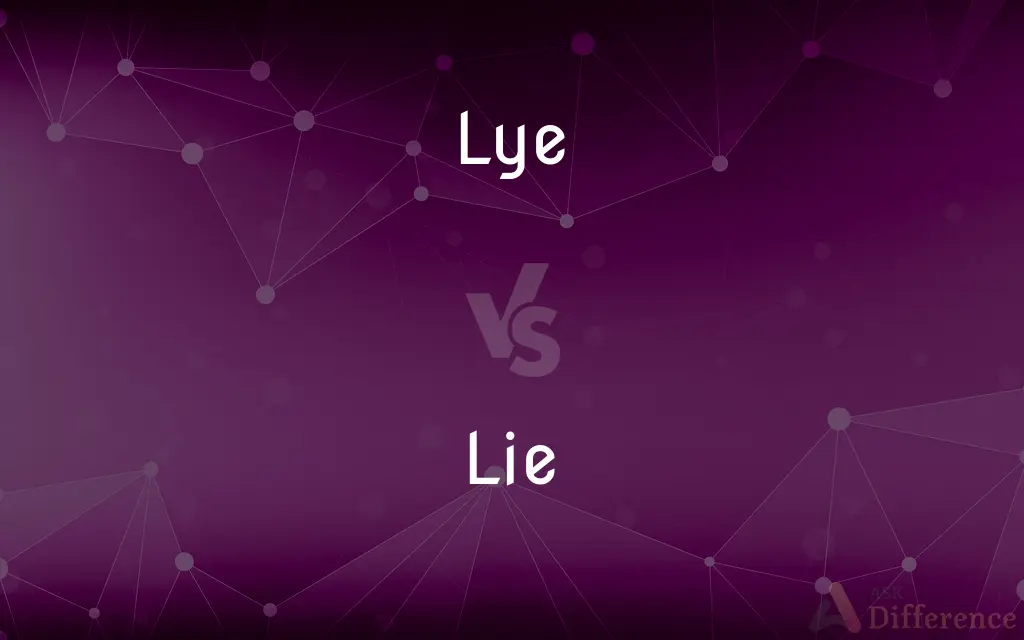Lye vs. Lie — What's the Difference?
By Tayyaba Rehman — Updated on October 12, 2023
Lye is a strong alkaline substance, often used in making soap. Lie is to be in a horizontal position or to tell an untruth.

Difference Between Lye and Lie
Table of Contents
ADVERTISEMENT
Key Differences
Lye and lie are distinct in definition and use, serving different functions within language and practice. Lye refers to a powerful alkaline substance, typically sodium hydroxide, which is utilized for its potent chemical properties, particularly in cleaning and soap-making. Lie, however, possesses dual meanings, namely to recline horizontally and to convey an untruth, thus engaging varied contexts in daily usage.
Lye, often derived from wood ash historically, plays a significant role in various chemical processes due to its caustic nature and capability to neutralize acids. Contrarily, lie, when referring to a state of reclining, involves no such chemical implications but designates a physical position or action, namely that of rest or repose on a surface.
In the realm of communication and ethics, lye holds no inherent moral weight or relational implications, being an inanimate substance devoid of intentionality. In sharp contrast, a lie, representing an untruth intentionally told, invites a plethora of ethical considerations and potential interpersonal ramifications, marking a significant moral divergence from the amoral lye.
Lye finds its usage predominantly within the field of material science and household applications, participating in processes such as saponification, which creates soap, and the cleaning of certain materials. Meanwhile, lie traverses a multitude of fields, from literature, with symbolic and moral themes around truth and deceit, to everyday interpersonal interactions, where one may lie down to rest or potentially tell a lie.
Where lye involves practical considerations regarding handling and storage, due to its corrosive nature, lie enters the domain of philosophical and ethical deliberations, becoming a point of reflection regarding honesty, integrity, and moral standing. Thus, lye and lie, despite phonetic similarities, dwell in disparate realms of physicality and morality, utility and philosophy.
ADVERTISEMENT
Comparison Chart
Part of Speech
Noun
Verb/Noun
Usage Context
Chemical processes
Physical position or untruth
Moral Weight
None
Can possess ethical implications
Fields of Relevance
Science, manufacturing
Various, including ethics and physical description
Phonetic Similarity
Pronounced /laɪ/
Pronounced /laɪ/
Compare with Definitions
Lye
A substance used in certain cleaning applications.
Lye can be used to clean the drains effectively.
Lie
To be in a horizontal or resting position.
I need to lie down after that run.
Lye
A chemical utilized in food preparation.
Lye is used to create the characteristic texture of pretzels.
Lie
To be located or situated somewhere.
The pen lies on the table.
Lye
A lye is a metal hydroxide traditionally obtained by leaching wood ashes, or a strong alkali which is highly soluble in water producing caustic basic solutions. "Lye" most commonly refers to sodium hydroxide (NaOH), but historically has been used for potassium hydroxide (KOH).
Lie
To stay in a state of rest or inactivity.
The car lies unused in the garage.
Lye
A strongly alkaline solution, especially of potassium hydroxide, used for washing or cleansing.
Lie
To exist in a specified state.
Opportunities lie ahead in the future.
Lye
The liquid obtained by leaching wood ashes.
Lie
A lie is an assertion that is believed to be false, typically used with the purpose of deceiving someone. The practice of communicating lies is called lying.
Lye
See potassium hydroxide.
Lie
(of a person or animal) be in or assume a horizontal or resting position on a supporting surface
I had to lie down because I was groggy
The body lay face downwards on the grass
Lily lay back on the pillows and watched him
Lye
See sodium hydroxide.
Lie
Be, remain, or be kept in a specified state
Putting homeless families into private houses that would otherwise lie empty
The abbey lies in ruins today
Lye
An alkaline liquid made by leaching ashes (usually wood ashes).
Lie
(of a place) be situated in a specified position or direction
Kexby lies about five miles due east of York
Lye
Potassium or sodium hydroxide (caustic soda).
Lie
(of an action, charge, or claim) be admissible or sustainable
An action for restitution would lie for money paid in breach of the law
Lye
Obsolete spelling of lie
Lie
Tell a lie or lies
‘I am sixty-five,’ she lied
Why had Ashenden lied about his visit to London?
Lye
A short side line, connected with the main line; a turn-out; a siding.
Lie
The way, direction, or position in which something lies
He was familiarizing himself with the lie of the streets
Lye
To treat with lye.
Lie
An intentionally false statement
The whole thing is a pack of lies
They hint rather than tell outright lies
Lye
Obsolete spelling of lie.
Lie
To be or place oneself at rest in a flat, horizontal, or recumbent position; recline
He lay under a tree to sleep.
Lye
A strong caustic alkaline solution of potassium salts, obtained by leaching wood ashes. It is much used in making soap, etc.
Lie
To be placed on or supported by a surface that is usually horizontal
Dirty dishes lay on the table. See Usage Note at lay1.
Lye
Sodium hydroxide or potassium hydroxide, or a concentrated aqueous solution of either compound.
Lie
To be or remain in a specified condition
The dust has lain undisturbed for years. He lay sick in bed.
Lye
A short side line, connected with the main line; a turn-out; a siding.
Lie
To exist; reside
Our sympathies lie with the plaintiff.
Lye
A falsehood.
Lie
To consist or have as a basis. Often used with in
The strength of his performance lies in his training.
Lye
A strong solution of sodium or potassium hydroxide
Lie
To occupy a position or place
The lake lies beyond this hill.
Lye
A highly caustic alkaline substance.
Lye is often used in making soap.
Lie
To extend
Our land lies between these trees and the river.
Lye
A material used in alkalizing.
The pH of the solution was adjusted using lye.
Lie
To be buried in a specified place.
Lye
A compound known for its corrosiveness.
Always handle lye with care to prevent skin burns.
Lie
(Law) To be admissible or maintainable.
Lie
(Archaic) To stay for a night or short while.
Lie
To present false information with the intention of deceiving.
Lie
To convey a false image or impression
Appearances often lie.
Lie
To say or write as a lie.
Lie
The manner or position in which something is situated.
Lie
A haunt or hiding place of an animal.
Lie
(Sports) The position of a golf ball that has come to a stop.
Lie
A false statement deliberately presented as being true; a falsehood.
Lie
Something meant to deceive or mistakenly accepted as true
Learned his parents had been swindlers and felt his whole childhood had been a lie.
Lie
(intransitive) To rest in a horizontal position on a surface.
The book lies on the table;
The snow lies on the roof;
He lies in his coffin
Lie
(intransitive) To be placed or situated.
Lie
To abide; to remain for a longer or shorter time; to be in a certain state or condition.
To lie waste; to lie fallow; to lie open; to lie hidden; to lie grieving; to lie under one's displeasure; to lie at the mercy of the waves
The paper does not lie smooth on the wall.
Lie
Used with in: to be or exist; to belong or pertain; to have an abiding place; to consist.
Lie
Used with with: to have sexual relations with.
Lie
Used with on/upon: to be incumbent (on); to be the responsibility of a person.
Lie
(archaic) To lodge; to sleep.
Lie
To be still or quiet, like one lying down to rest.
Lie
(legal) To be sustainable; to be capable of being maintained.
Lie
(intransitive) To give false information intentionally with intent to deceive.
When Pinocchio lies, his nose grows.
If you are found to have lied in court, you could face a penalty.
While a principle-based approach might claim that lying is always morally wrong, the casuist would argue that, depending upon the details of the case, lying might or might not be illegal or unethical. The casuist might conclude that a person is wrong to lie in legal testimony under oath, but might argue that lying actually is the best moral choice if the lie saves a life.
Lie
(intransitive) To convey a false image or impression.
Photographs often lie.
Lie
To be mistaken or unintentionally spread false information.
Sorry, I haven't seen your keys anywhere...wait, I lied! They're right there on the coffee table.
Lie
(golf) The terrain and conditions surrounding the ball before it is struck.
Lie
(disc golf) The terrain and conditions surrounding the disc before it is thrown.
Lie
(medicine) The position of a fetus in the womb.
Lie
A manner of lying; relative position.
Lie
An animal's lair.
Lie
An intentionally false statement; an intentional falsehood.
I knew he was telling a lie by his facial expression.
Lie
A statement intended to deceive, even if literally true.
Lie
(by extension) Anything that misleads or disappoints.
Lie
See Lye.
Lie
A falsehood uttered or acted for the purpose of deception; an intentional violation of truth; an untruth spoken with the intention to deceive.
The proper notion of a lie is an endeavoring to deceive another by signifying that to him as true, which we ourselves think not to be so.
It is willful deceit that makes a lie. A man may act a lie, as by pointing his finger in a wrong direction when a traveler inquires of him his road.
Lie
A fiction; a fable; an untruth.
Lie
Anything which misleads or disappoints.
Wishing this lie of life was o'er.
Lie
The position or way in which anything lies; the lay, as of land or country.
He surveyed with his own eyes . . . the lie of the country on the side towards Thrace.
Lie
To utter falsehood with an intention to deceive; to say or do that which is intended to deceive another, when he a right to know the truth, or when morality requires a just representation.
Lie
To rest extended on the ground, a bed, or any support; to be, or to put one's self, in an horizontal position, or nearly so; to be prostate; to be stretched out; - often with down, when predicated of living creatures; as, the book lies on the table; the snow lies on the roof; he lies in his coffin.
The watchful traveler . . . Lay down again, and closed his weary eyes.
Lie
To be situated; to occupy a certain place; as, Ireland lies west of England; the meadows lie along the river; the ship lay in port.
Lie
To abide; to remain for a longer or shorter time; to be in a certain state or condition; as, to lie waste; to lie fallow; to lie open; to lie hid; to lie grieving; to lie under one's displeasure; to lie at the mercy of the waves; the paper does not lie smooth on the wall.
Lie
To be or exist; to belong or pertain; to have an abiding place; to consist; - with in.
Envy lies between beings equal in nature, though unequal in circumstances.
He that thinks that diversion may not lie in hard labor, forgets the early rising and hard riding of huntsmen.
Lie
To lodge; to sleep.
Whiles I was now trifling at home, I saw London, . . . where I lay one night only.
Mr. Quinion lay at our house that night.
Lie
To be still or quiet, like one lying down to rest.
The wind is loud and will not lie.
Lie
To be sustainable; to be capable of being maintained.
What he gets more of her than sharp words, let it lie on my head.
Lie
A statement that deviates from or perverts the truth
Lie
Norwegian diplomat who was the first Secretary General of the United Nations (1896-1968)
Lie
Position or manner in which something is situated
Lie
Be located or situated somewhere; occupy a certain position
Lie
Be lying, be prostrate; be in a horizontal position;
The sick man lay in bed all day
The books are lying on the shelf
We had to stand for the entire performance!
Lie
Originate (in);
The problems dwell in the social injustices in this country
Lie
Be and remain in a particular state or condition;
Lie dormant
Lie
Tell an untruth; pretend with intent to deceive;
Don't lie to your parents
She lied when she told me she was only 29
Lie
Have a place in relation to something else;
The fate of Bosnia lies in the hands of the West
The responsibility rests with the Allies
Lie
Assume a reclining position;
Lie down on the bed until you feel better
Lie
To tell something that is not true.
I will not lie to my best friend.
Common Curiosities
Is lye safe to handle?
Lye can be dangerous and corrosive, so it should be handled with care and protective gear.
Can lye be made at home?
Historically, lye was made at home using wood ash and water, though modern versions are manufactured.
What does lie mean in terms of position?
To lie refers to being in a horizontal position, typically indicating rest or relaxation.
Does lie only refer to physical position?
No, lie can also refer to stating something untrue intentionally.
Can lye be replaced in soap-making?
Traditional soap-making requires lye, but melt-and-pour soap bases provide a lye-free alternative.
Can lie refer to an object’s position?
Yes, lie can indicate the position or placement of an object (e.g., The book lies on the table).
What is lye used for?
Lye is commonly used for making soap, cleaning, and sometimes in food preparation.
Is lye natural or synthetic?
Lye can be derived naturally or produced synthetically for commercial use.
Can lye and lie be used interchangeably?
No, lye and lie cannot be used interchangeably as they have entirely different meanings and uses.
How is lie used grammatically?
"Lie" can be used as both a verb (e.g., to lie down) and a noun (e.g., telling a lie).
Is there a noun form of the verb lie (position)?
No, lie as a verb doesn’t have a corresponding noun form for its meaning of position.
Can lye be used in cooking?
Yes, lye is used in some cooking processes, like making traditional pretzels.
Can a lie be unintentional?
Typically, a lie refers to an intentional untruth, whereas unintentional inaccuracies might not be deemed lies.
How does lye interact with acids?
Lye, being alkaline, neutralizes acids, resulting in a salt and water.
Can lying have moral implications?
Yes, lying can carry moral and ethical implications, often viewed negatively.
Share Your Discovery

Previous Comparison
Quaff vs. Coif
Next Comparison
Clitch vs. ClutchAuthor Spotlight
Written by
Tayyaba RehmanTayyaba Rehman is a distinguished writer, currently serving as a primary contributor to askdifference.com. As a researcher in semantics and etymology, Tayyaba's passion for the complexity of languages and their distinctions has found a perfect home on the platform. Tayyaba delves into the intricacies of language, distinguishing between commonly confused words and phrases, thereby providing clarity for readers worldwide.















































